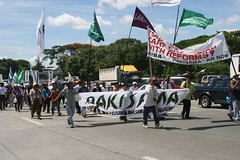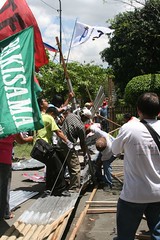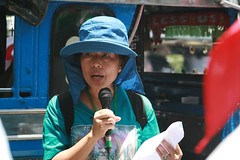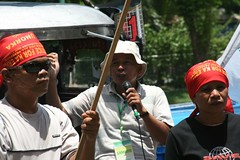13 June 2007
 Quezon City, Philippines – Tearing down makeshift walls of a police detachment that is being built in front of the Department of Agrarian Reform (DAR) compound, farmers shouted their demand for the reform and extension of the Philippine’s Comprehensive Agrarian Reform Program (CARP), which is due to end in June next year, amid criticisms of the government’s failure to implement it.
Quezon City, Philippines – Tearing down makeshift walls of a police detachment that is being built in front of the Department of Agrarian Reform (DAR) compound, farmers shouted their demand for the reform and extension of the Philippine’s Comprehensive Agrarian Reform Program (CARP), which is due to end in June next year, amid criticisms of the government’s failure to implement it.
“These walls are symbols of the government’s protection of the landowners, instead of the farmers, so we are tearing them down,”cried Renato Penas, Chairperson of the Pambansang Kilusan ng mga Samahang Magsasaka (PAKISAMA), a national confederation of farmers organizations in the Philippines, as he and other farmer leaders use their hands to destroy the makeshift walls.
Around 300 farmers, fishers, rural women and children with their support groups coming from  national and international NGOs marched from Commonwealth Avenue to Quezon Circle at 9:00 AM last June 12, which also marks the 109th anniversary of Philippine Independence.
national and international NGOs marched from Commonwealth Avenue to Quezon Circle at 9:00 AM last June 12, which also marks the 109th anniversary of Philippine Independence.
The farmers’groups that gathered in front of DAR included national federations such as PAKISAMA, Pambansang Katipunan ng mga Samahan sa Kanayunan, Task Force Mapalad, Ugnayan ng Nagsasariling Organisasyon sa Kanayunan, Pambansang Kilusan ng mga Magbubikid ng Pilipinas, NGOs and agrarian reform advocates in the Philippines.
Farmer leaders from Asian Farmers’ Association for Sustainable Rural Development (AFA), a regional alliance of national farmers’ organizations in eight Southeast and North Asia countries, joined the rally in solidarity with the Filipino farmers.
Representatives from AFA’s member organizations, SorKorPor in Thailand, API in Indonesia, TWADA in Taiwan, VNFU in Vietnam, and FNN in Cambodia are here in the Philippines for a regional-consultation workshop on farmers’ situation from June 12-15.
AFA Vice-Chairperson Ms. Sudaporn Sittisathapornkul, a farmer-leader from SorKorPor, delivered  the association’s solidarity statement and urged the Philippine government to continue the implementation of the program.
the association’s solidarity statement and urged the Philippine government to continue the implementation of the program.
“Our farmers from Taiwan, Korea, Japan, and Vietnam have been successful in their land redistribution and the development of farmes in these countries was primarily because of land redistribution,” said Sittisathapornkul.
During the rally, farmers from Task Force Malapad carried the pictures of the two farmers who were recently killed by the bodyguards of landowner Roberto Cuenca in Negros Occidental after they tried to install themselves in the 144-hectare land distributed to them under CARP.
“We denounce the killings of farmer leaders and NGO workers who are at the forefront of the struggle for agrarian reform,” said Sittisathapornkul.
“We believe that government should protect farmers’ rights and must give all resources so they can fully benefit from government’s program,” she added.
API Chairperson Sambito from Indonesia, speaking before the rally, identified with the Filipino farmers’plight.
He said that Indonesian farmers also face violence form the military. Just recently, 4 Indonesian farmers were killed when they resisted the encroachment of the military in the land they were tilling.
farmers were killed when they resisted the encroachment of the military in the land they were tilling.
“We are one with you in your struggle for your land and for justice for the farmers,” Sambito said.
Nineteen years after the Comprehensive Agrarian Reform Law (CARL) was signed into law on June 10, 1988, landlessness remains the biggest problem of Filipino farmers, many of whom live in abject poverty.
One year before it ends, more than 1 million hectares of prime agricultural land identified under the program have yet to be redistributed, while landowners’ resistance have intensified.
The agrarian reform movement is no doubt facing an uphill and difficult battle; one that the Filipino farmers are ready to fight for, alongside their Asian comrades.
by Jun Virola, AFA Technical Assistant



Comments are closed